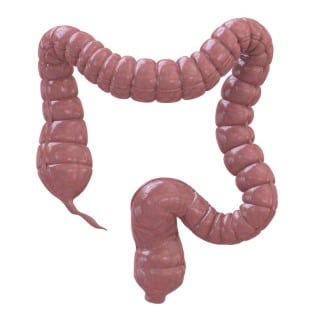Leaky gut, sometimes known as intestinal permeability, is a condition which results in perforations (holes) and damage to the lining of the intestines. This allows toxins and partially-digested fats and proteins to directly enter the bloodstream.
This often results in inflammation and allergic reactions. Just some symptoms of leaky gut include bloating, gas, lethargy, brain fog, skin issues, emotional problems, joint pain, and more.
In those who have leaky gut, there is usually an imbalance of gut flora, whereby the bad bacteria, which is toxic, greatly outnumbers the friendly flora, or good bacteria. Initially, this could have been caused by a course of antibiotics that killed all the gut’s good bacteria and provided the perfect environment for the bad bacteria to proliferate.
Poor diet can also cause an imbalance in the gut flora. Too much sugar–whether refined or unrefined–is often responsible. Bad bacteria feed off sugary food, and grow out of control, while the good bacteria struggle to survive. In the process, the gut’s mucus lining–where many of our immune cells live–can be damaged.
Toxins from drugs and medications, can also be the cause of an imbalanced gut flora. Even stress, which results in the release of cortisol and other hormones into the bloodstream, can play a part.
While there are many factors which can lead to leaky gut, the good news is that the situation can be reversed. However, it is important to note that if nothing is done about it, leaky gut can be the cause of autoimmune conditions such as Crohn’s disease, irritable bowel and liver toxicity.
There is a number of herbs that can remedy gut inflammation. Perhaps the best of these is slippery elm. Others include marshmallow root, aloe vera gel, turmeric and other demulcent herbs. Licorice root can also be effective in controlling cortisol levels and soothing the digestive tract.
Where there is infection involved, antibiotic herbs such as garlic, echinacea, calendula, oregano, goldenseal or plantain are the go-to herbs. Unlike conventional antibiotics, these herbs kill the bad bacteria without affecting the good flora.
As well as eliminating the bad bacteria, we can work to build up the good bacteria. Probiotics and fermented foods are just two such ways to do this. The digestive enzymes that the friendly flora create help to better break down food, and prevent undigested food particles from leaking through the colon. Thoroughly chewing any food you eat helps to make the best use of the enzymes that are present in the saliva. This is where the digestive process begins.
Dairy, sugar, gluten and soy should be avoided, sufficient water should be drunk each day to ensure you are hydrated, and regular exercise is very helpful.
Let’s take a moment to look at prebiotics. It’s one of the latest buzzwords in the health food industry, but how much do you know about them?
Put simply, prebiotics is the fibre from fruits and vegetables. This fibre feeds the good bacteria in the gut, and helps to create a better environment in which the good bacteria can begin to proliferate.
According to the late herbalist and my mentor, Dr. John Christopher, 90% of all diseases begin in the colon. More and more, science is backing this up. This is why I recommend everyone do a colon cleanse at least twice a year.
Taking some time to understand the gut and making some changes to diet and lifestyle can help our gut health, making our whole body healthier.

